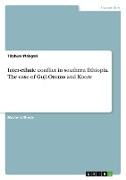Read more
Master's Thesis from the year 2023 in the subject African Studies - Culture and Applied Geography, Dilla University (College of social science and humanities), language: English, abstract: Inter-ethnic conflict is one of the serious challenges in any multi-ethnic federation like Ethiopia. This study deals with the inter-ethnic conflict between the Guji and Koore ethnic groups. The main aim of this thesis is to examine the underlying causes, contributing factors, actors, dynamics, and impacts of the inter-ethnic conflict in the study area.
The findings of this study reveal that the Guji and Koore have had a long history of friendly coexistence and occasional conflict. In earlier times, the Guji-Koore conflict was caused by competition over land resources for farming and grazing. Nevertheless, after three decades, conflicts have intensified and changed due to a range of factors, including the formal creation of NNPs and changes in the federal structure of Ethiopia. The actors involved in the conflict were individual agriculturalists and agro-pastoralists, youth and adults, the OLF fighters, the political elites and women, who played a role by aggravating and encouraging the people. Indeed, the study revealed and analyzed the consequences and impacts of the Guji-Koore conflict: socially, the previous mutual relationship is being eroded; free movement of the people in the conflicted Kebeles is restricted; economically, individual houses of both Guji and Koore were burned and people were displaced from their residences; and politically, the accountability and responsibility of government officials in making decisions related to managing and resolving the inter-ethnic conflict are reduced.
To manage the conflict and build peace in the study area, formal and indigenous mechanisms of conflict management and peacebuilding were undertaken. However, the attempts failed to address the root causes of the conflict and build lasting peace. In the study area, weak local government institutions, a lack of effective illegal arms control, a lack of trust and communication, a lack of involvement of all actors, and hybrid peace in conflict resolution are obstacles to sustainable peace between the Guji and Koore ethnic groups. The current study shows that the area needs immediate attention from all concerned bodies and should implement different mechanisms and strategies to bring peace to the study area.
About the author
I am Tilahun Wakgari lecturer of Dilla University, Ethiopia. I graduated my first degree with Civics and Ethical Studies from Dilla University, Ethiopia and My second degree with Peace and Conflict Studies from the collaboration of Dilla University,Ethiopia and The UiT Arctic University of Tromso, Norway. Tilahun is the energetic and reseonable youth in any issues

